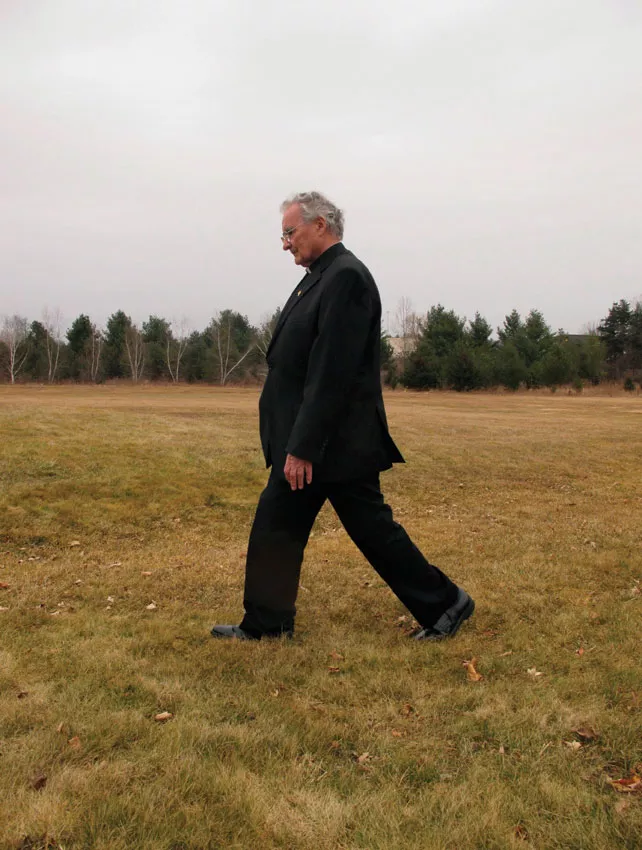Father Charlie Coen, 1933-2024

Monsignor Charles Coen, or "Father Charlie" as we knew him, spread the enjoyment, humor, and humility of Irish music to legions of friends during his eventful life.
Born in Drimnmuckla, a small farming hamlet outside Woodford, Co. Galway, Father Charlie was afflicted by asthma and not expected to survive past his teens. He followed his older brother Jack in immigrating to the United States at the age of 21, only weighing 117 pounds.
He worked as a bellhop at Grossinger's Hotel in the Catskill Mountains, where the clear air eased his asthma symptoms and – perhaps with the famed "Borscht Belt" living up to its name – quickly got up to a weight of 160 pounds. Four years later, he joined the priesthood, which would be his vocation for the rest of his life.
Father Charlie had begun learning music at age 13 from his father, a concertina player, as well as his brother Jack, an accomplished flute player. He was also influenced by musicians in the locality like Jim and John Conroy.
His family didn't own a radio for most of his early life, so his music came through the community – via family members or at house dances held a few times each year. He often told me about riding a bike miles back home through dark roads at night. If you heard a good tune, you had to hum it yourself the whole way to make sure you didn't forget it!
While stationed as a pastor in Staten Island for 18 years, he began teaching Irish music to the community. He started a choir singing songs in Irish. Musicians like Tony DeMarco and Linda Hickman would often stop by for a few tunes.
Father Charlie himself was in fine playing form and managed the rare feat of winning three All-Ireland championships on the same day with flute, concertina, and tin whistle in 1976.
In 1977, through the urging and assistance of Mick Moloney – who we sadly lost in 2022 – Father Charlie recorded a duet album called The Branch Line with his brother Jack. Recorded in their kitchen during a single afternoon by Mick, the album is a shining example of the East Galway style of music that the Coens typify. The music is unhurried, flowing, humble, and full of personality.
In 1987, the year I was born, Father Charlie was named pastor in Red Hook, NY – the next town over from me.
My parents are artists with no Irish connections, but when I was 7, they heard of a new Irish music concert series on the first and second Sunday of each month. It was held at the Rhinecliff Hotel, a local dive bar next to the Hudson River train line, with a single swaying light bulb to illuminate the graffiti-covered stage.
My parents began taking me every week. I didn't know at the time but I was getting exposed to the cream of the crop for Irish musicians in America: Joe and Joanie Madden, Felix and Brendan Dolan, Mick Moloney, Jack and Jimmy Coen, Seamus Connolly, Mike and Mary Rafferty, and many more. These folks loved coming up to visit with Father Charlie and play a few tunes for the small but growing cohort of Irish music fans that Father Charlie was steadily converting.
He ran this concert series for 17 years and as I started picking out a few tunes on the accordion, he would invite me in from the back of the session to sit in the main circle. Every week he would say "Danny, would you like to play one on your own?" and I would excitedly break out the tune I had practiced that week. Some of these selections can only be described as musical catastrophes (Tico, Tico being a prime and repeat offender) but he always nodded and smiled afterwards with a "Very good, very good."
Positive reinforcement was his approach. He had the patience of a saint. Through years of sessions and later lessons and gigs with him, I never saw him lose his temper. Because he was so accommodating and encouraging to everyone around him, he sat through many the errant bodhran, bones, or guitar player. But that's why everyone loved him. He made Irish music something fun. It wasn't for ego or competition – it was more of a zen state where you could get lost in the music and forget about anything else.
Sadly, in 2018, he was accused by a former parishioner of committing sexual harassment in 1978. This was part of a Catholic church program to pay cash settlements to abuse accusers before cases could be brought to court. I have no idea whether that specific claim is true or not. However, as someone who spent countless hours alone with him over the years, including as a child, I never encountered the slightest hint of anything improper. It does not fit with the personality or music of the person I knew.
Father Charlie passed away on December 26, 2024. For some reason, similar to the late Felix Dolan or Mick Moloney, it doesn't feel to me like he is gone. His legacy reminds me to enjoy Irish music for its own inherent beauty, for its fun, and humor. No matter what's happening in the world, we can enjoy music the same way he did when he was growing up – not for money or fame, but for community and the ties between us.